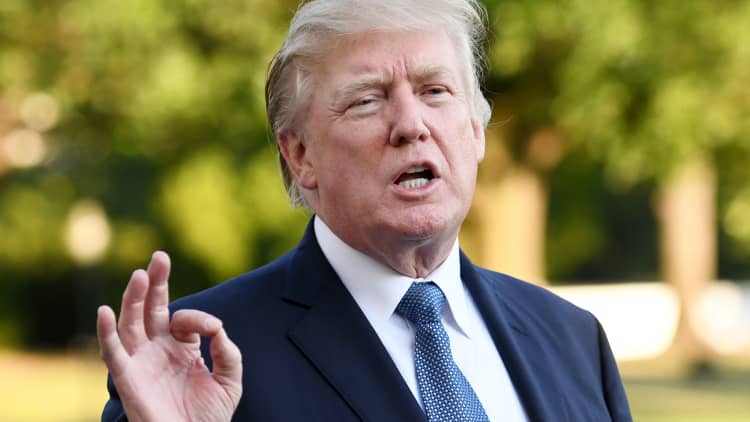
The much anticipated tax plan from the "Big Six" raises more questions than it answers but was just as expected — light on detail, Cowen's policy analyst Chris Krueger said.
But on the positive side, he pointed out that the tax document released Wednesday expanded over the summer from a few thin paragraphs to nine whole pages. That was "progress," even if it depended on "aggressive spacing and font size" to fill it out.
Krueger, in a note, said there were a few big takeaways from the plan developed by the Big Six, a group made up of Congressional Republican leadership, Treasury Secretary Steven Mnuchin and Trump economic advisor Gary Cohn.
First, the "low bar was met," and there were no detailed offsets and no revenue or deficit numbers.
The plan would eliminate seven tax brackets for individuals and replace them with just three. The top tax bracket for individuals would be lowered to 35 percent from 39.6 percent, which Krueger said "takes just about every Congressional Democrat out of the game." The lowest tax rate would rise to 12 percent from 10 percent, "still a net-tax cut, but optics are pretty bad."
The proposed reduction in the corporate tax rate to 20 percent from 35 percent would cost about $1.6 trillion. The would go to 25 percent, lowering the tax burden for small business owners who are subject to higher individual tax rates.
But the analyst said he was skeptical the plan could get through. "We would expect any timetable associated with the Big Six blueprint to continue the dominant legislative trend of 2017: over-promising and under-delivering," wrote Krueger.
"We continue to believe nothing will pass on taxes this year or next," he wrote.
As for deductions, the plan aims to streamline them for individuals but specifically promises to retain mortgage and charitable deductions.
One way the plan proposes to raise money is by eliminating the state and local tax deductions, something that would disproportionately hit districts in California, New York, Minnesota, Michigan and New Jersey. "This is very easy to label the "blue state" tax, which means all Congressional Republicans will vote for the elimination," wrote Krueger, noting it's a "no-brainer" to dump in and raise $1.3 trillion.
But there's a potential problem in getting it approved. There are 52 Republicans in the House from those states and the GOP has a 24-seat majority. "The central canon of tax reform is the goring of the sacred cows," he wrote. "One of the problems with that is that the most expensive cows are holier than others."
There was also a controversial element that would limit some of the interest deductions for corporations. Companies would be able to immediately write-off investments in their businesses instead.
"That is a pretty big deal and a surprise. After border adjustments, the net interest deduction is the most controversial and lobbied offset in tax reform," Krueger wrote.
As a businessman, Trump never balked at debt, and has called himself the "king of debt."
"King of Debt strikes down the net-interest deduction? Great twist," Krueger wrote.


